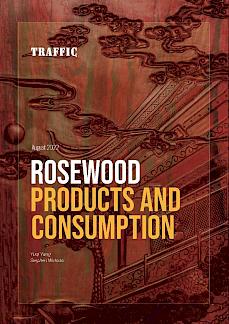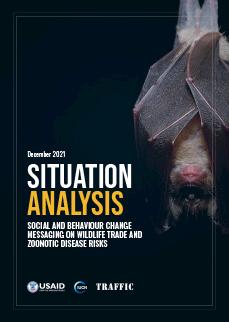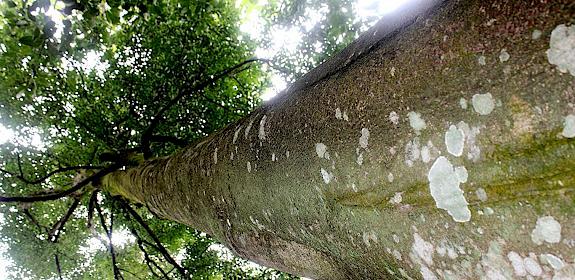
Jakarta Bird Market, Photo: TRAFFIC / Krishnasamy, K
i
Changing attitudes and actions to ensure wildlife trade isn’t a threat to the conservation of nature
The 2019 Intergovernmental Panel on Biodiversity and Ecosystem Services (IPBES) Global Assessment identified direct overexploitation as the second most significant cause of biodiversity decline, threatening a million species with extinction.
Human values and behaviours were recognised as at the root of all indirect drivers of threat to healthy functioning ecosystems and resilience in nature, but also central to the most critically needed transformative solutions. TRAFFIC is responding to this imperative by pioneering best practice in the social and behavioural sciences along wildlife trade value chains, and by using Social and Behaviour Change (SBC) evidence and insight to build capacity, guide global dialogue, catalyse innovative partnerships and inform thought leadership.
Region / country focused initiatives:
CHINA
Issue: The illegal consumption of wildlife commodities for collection
Solution: The ‘Green Collection’ initiative in China (2017-2021).
Impact: This successfully stimulated antique, art and collection industry transformation by engaging former elephant ivory ‘Master Carvers’ in producing exquisite figurines using fruit pits, to show that the value of the product is in the skill and quality of the craftmanship rather than the material used. A reduction in stated intention to purchase ivory in the future was recorded amongst the core target audience, and informed activities with Chinese government officials, training them to apply SBC principles in their work.
Thailand
Issue: The illegal consumption of wild meat products
Solution: The ‘Kind Dining’ initiative (2019-2022).
Impact: An eight percent point increase (from 26% to 34%) was recorded in target audience responses between the baseline and endline survey, around the social unacceptability of consuming illegal wild meat. A four percent point increase (from 51% to 55%) was also recorded in target audience responses between the baseline and endline survey, around intention to reject wild meat in the future. Amongst those in the endline survey who originally said they would not reject illegal wild meat in the future, 74% subsequently reported being demotivated to do so by the campaign.
Viet Nam
Issue: The illegal consumption of rhino horn in Viet Nam
Solution: The ‘Chi’ social marketing initiative (all phases 2014-2021). This aimed to reduce demand for rhino horn amongst the highest priority user group, a target audience of men aged 30-55yrs doing so to display success and status.
Impact: Chi Phase I reduced the target audience’s stated intention to buy rhino horn in the future from 16% to 9% of the survey sample. Chi Phase II was awarded ‘Highly Commended’ status at the 2019 World Social Marketing Conference, and cited as evidence that change is possible in the Dasgupta Review on The Economics of Biodiversity. During Chi Phase III those exposed to Chi messaging were 22% less likely to buy rhino horn than those not exposed.
Europe
Issue: Illegal consumption of exotic pets and overconsumption of MAPS in the EU
Solution: Demand reduction initiatives were made the first priority of the EU Action Plan Against Wildlife Trafficking to address wildlife overexploitation, and TRAFFIC was subsequently engaged by the Commission to convene and deliver an ‘Expert Roundtable’, to inform and catalyse implementation of behaviour change and awareness-raising strategies to address this challenge. The event attracted 130 participants both online and in person in Brussels, 21st March, 2023.
Impact: To be determined.
Africa
Issue: Poaching and overexploitation of natural resources, particularly wild meat
Solution: TRAFFIC has been collaborating with rural communities in East Africa, through women’s micro-finance (‘Vicoba’) groups, religious centres and Community Based Organisations, to reduce the risk of unsafe and unsustainable wildlife trade, with a focus on strengthening game meat sourcing and sales. Complementary training for editors, broadcast and print journalists in Kenya, Uganda and Rwanda has been delivered alongside this, using SBC principles.
Impact: To be determined
Latin America
Issue: Over-harvesting, trade and consumption of species such as parrots/ toucans, turtles / tortoises and amphibians
Solution: Peru expressed an interest in hosting a regional pilot of the CITES Guidance on Demand Reduction, and training was provided to 13 Management Authorities from across the region. TRAFFIC prepared a Briefing Paper on the key issues which was published as an Inf. Doc for CITES CoP19, and is in the process of finalising a Research Protocol and research process report demonstrating delivery of Steps 1 and 2 of the Five Step Process to DR.
Impact: To be determined
Malaysia
Issue: The sale and use of endangered and protected species in Malaysia’s Traditional Chinese Medicine (TCM) industry
Solution: The Ren Xin (仁心) or “Kind Heart” initiative (2023-2024).
A suite of messages, resources and engagement activities reached close to 7,000 members of Malaysia’s most significant TCM association. A thousand copies of a unique handbook to guide industry players on laws and alternatives not based on endangered species, were distributed. Target audience polling showed an overall increase in awareness of the legality issues surrounding a selection of endangered species-based traditional medicines, ranging from 11% to 25%. A conference assembling a range of TCM players and regulators was oversubscribed by 50%, with close to 100% of participants expressing satisfaction and enthusiasm for more. An influencer-based marketing campaign directed at TCM users drew 685,000 viewers, while 48,000 people visited the campaign website, which continues to engage industry and consumers.
Global work packages
Capacity building
CITES: here, here, here and here
“TRAFFIC has been supporting CITES Parties to enhance their approaches to delivery of the Demand Reduction Resolution (17.4) since 2017. In 2018 they led a review of experience and challenges with implementation which identified the need for further capacity building and guidance around how to use consumer behaviour change strategies in complement to enforcement measures and awareness-raising communications. As a result, TRAFFIC produced official Guidance for Parties which was formally adopted and enshrined in the Resolution text at CoP19”
“TRAFFIC is leading implementation of a two-year Technical Support Programme for 30+ countries delivering GEF supported projects related to combatting illegal wildlife trade for sustainable development”.
Collaborative Partnerships
Social and Behaviour Change Community:
www.changewildlifeconsumers.org Toolkit
Behaviour Change for Conservation e-Course
1st International Conference on Behaviour Change in Conservation.
2nd International Conference on Behaviour Change in Conservation.
“Since 2016 TRAFFIC has convened a ‘SBC Community’, fostering collaboration and facilitating capacity building amongst ~1,000 individuals from 100+ organisations through a range of tools, activities, outputs and events. 90% of the 100+ delegates from 60 organisations and 21 countries participating in the 2nd International Conference reported they had been inspired and enabled to champion behaviour change in their work, and the Behaviour Change for Conservation e-Course has been accessed over 8,000 times since it’s launch on World Wildlife Day 2020”.
One Health
Situation Analysis on SBC Messaging on Wildlife Trade and Zoonotic Disease Risks.
Analysis of the potential for SBC to encourage safer, more sustainable and legal practices around the acquisition, processing and sale of wild animals used for meat, medicine and pets.
Options Paper on Public and Stakeholder Engagement Strategies (in prep)
This Options Paper aims to support government communications and public health specialists deliver SBC to change human behaviours and reduce zoonotic disease risks associated with wildlife trade.
SNBC for Anti-corruption
Changing Corruption Behaviours through an INTEGRITY Framework.
Behavioural Drivers of Corruption in IWT Problem Analysis.
Exploration of the potential for Social Norms and Behaviour Change (SNBC) approaches to help combat natural resource corruption, and production of associated frameworks for change.
Thought leadership
TRAFFIC is a recognised thought leader on applying social and behaviour change for conservation goals and has published many resources on related topics. A selection are as below:
- OECD High Level Forum on Risk, Powers of Persuasion
- Research Analysis on Strategies to Reduce Demand for IWP
- Nudging for Nature: here, here and here
- Good Practice Guide Messages
- Good Practice Guide Messengers
- Briefing Paper on Research Methods to Identify the Drivers and Dynamics of Demand and Impact of Demand Reduction Initiatives
- Evolving Evaluation
- SNBC Research Protocol: Baseline and Formative Research (being finalised)
- SNBC Research Protocol: Monitoring & Impact Evaluation (being finalised)
- CITES DR Guidance: Pilot in LAC: Research Protocol Steps 1 and 2 (in prep)
- CITES DR Guidance: Pilot in LAC: Delivery of Steps 1 and 2 (in prep)
TRAFFIC also contributes to relevant discussions through Membership of:
- The IUCN Commission on Education and Communications
- The Biodiversity Communications Working Group of the UN Consumer Information Programme on Sustainable Consumption and Production
- The UN Innovation Network on Behavioural Science
Social research
TRAFFIC has applied a range of social research techniques to gain insight into motivations, enablers and drivers for sustainable and legal wildlife trade e.g.,
- The People Beyond the Poaching
Report summarising research to acquire social and psychological insight from those convicted of the poaching and trafficking of high-value fauna and flora species in Southern African protected areas. - Analysis of Benefits and Barriers for SMEs to Adopt Biodiversity Friendly Practices
related news and reports to behavioural change
explore news, materials and recent publications related to our behavioural change projects
latest reports and materials
Behaviour change is an increasingly important discipline within efforts to preserve threatened species. View our latest reports and resources on behavioural change below.
Visit our resource library for the full TRAFFIC publication archive.











